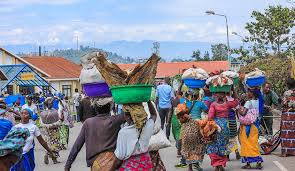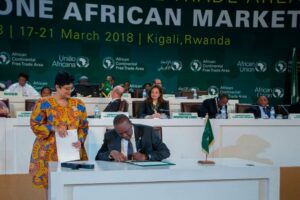
Incorporate informal cross-border traders into the formal Economy to boost trade in the East African Community
Gaps and Opportunities
Informal cross-border trade (ICBT) represents a crucial and necessary phenomenon in districts near borders such as between Kenya and Uganda, Tanzania and Uganda, and South Sudan and Kenya. So common is the practice that it is suggested that for certain products and countries, the value of informal trade may meet or exceed the values of formal trade transacted between East African nations. The trade is however largely regarded as illegal commercialization across the border despite its positive macroeconomic and social implication in income generation and food security enhancement. This has raised a critical policy concern for the East African Community even as it continues to pursue procedures and certification scheme harmonization to boost formal cross-border trade in the region. However, eliminating this trade practice would have undesirable consequences for the countries and for communities close to shared borders.
Cross Border Trade in East Africa
Vehicles, bicycles, push carts, hand and head, motorcycles, and wheelchairs are some methods that characterize both formal and informal cross-border trade in the region. So common is the ICBT practice, often akin to smuggling, that traders have been shown to use large vehicles to ferry goods close to borders and then hire alternative small-scale porters to ferry goods, via footpaths to reach the other side.
 It should be noted that while this trade is considered illegal, not all ICBT is intentionally deceptive, especially for small traders, often youth and women, close to border regions. A significant part of the trade occurred along the border long before the colonial boundaries were drawn. Thus, when some traders utilize these routes, they may not be maliciously breaking trade laws but rather following trade routes that have existed for generations. Nevertheless, this practice is expansive and raises debates on the morality of its elimination.
It should be noted that while this trade is considered illegal, not all ICBT is intentionally deceptive, especially for small traders, often youth and women, close to border regions. A significant part of the trade occurred along the border long before the colonial boundaries were drawn. Thus, when some traders utilize these routes, they may not be maliciously breaking trade laws but rather following trade routes that have existed for generations. Nevertheless, this practice is expansive and raises debates on the morality of its elimination.
Informal cross-border trade in East Africa is currently headlined by three groups. These include informal traders that operate outside the formal economy entirely and include smugglers and traditional traders, formal firms avoiding cross border regulations and duties, and formal firms that partially evade regulations and duties. Thus, common tactics include avoiding border posts, under-invoicing or misclassification of goods, and micro-to medium-sized enterprises. Notably, the latter is informed by a lack of resources to deal with the requirements of operating in the informal sector.
Trade Informality
The informality of cross-border trade is often related to the unregistered status of traders. However, the trade has significant poverty and developmental impacts as it constitutes a critical source of employment and livelihood for the poor, low-income, and low-skilled youth and women living close to borders. It is not lost on policymakers therefore that if properly supported, the trade can generate significant rural non-farm income catalyzing value chain creation, and offering support to rural areas. It can also significantly turn into a micro-entrepreneurial reality offering the potential to alleviate poverty, contribute to food security, and empower youth and women.
“One cannot underestimate the role informal trade plays in bolstering food security.”
Efforts to formalize elements of the ICBT phenomenon should therefore not focus on eliminating the practice, especially among communities within border districts but rather work on modalities to incorporate these informal traders into the formal economy. Informal cross-border trade is the lifeblood of many communities in East Africa. It is a source of livelihood for millions, particularly women, who often dominate this sector.
One cannot underestimate the role informal trade plays in bolstering food security. These traders engage in the exchange of goods, from food to textiles to electronics, across borders, contributing significantly to regional economic activity. Informal traders often serve as essential conduits for the flow of food staples across borders. During times of crisis, such as the COVID-19 pandemic, informal traders were instrumental in ensuring food availability and affordability.
Incorporating Informal Traders into the Formal Economy
Reducing border requirements and increasing the efficiency of legitimate trade across borders is a crucial first step in encouraging traders to participate in formal trade. The East African Community and the African Continental Free Trade Area trade protocols must therefore endeavor to address the complexities and opacity of trade barriers to ICBT especially where multiple overlapping trade arrangements exist in the region. Beyond the simplification and elimination of duties and fees on imports and exports, regional governments can focus on simplifying non-tariff trade barriers, such as documentation to make the process easy and accessible to traders.
Reducing corruption at borders is critical in the formalization of ICBT where weak law enforcement is often persuaded to allow and overlook smuggling. In addition, indirect costs, such as those associated with long waiting times with streamlined government procedures around documentation and certification should further be discouraged.
Informal traders close to borders can also benefit from capacity building for them to be equipped with the necessary skills and knowledge needed to thrive in the formal economy. Youth and women in particular will have better access to financial services for credit. Partnering with financial institutions can offer tailored financial products for ease of access to credit, savings, and insurance for formal cross-border trade.
A unified approach to incorporating informal cross-border trade into the formal economy can yield substantial benefits across the East African region. Collaborative efforts among neighboring countries can harmonize regulations, ease the movement of goods, and promote cross-border trade, ultimately enhancing regional integration and economic development. Governments can facilitate market linkages and partnerships between informal and formal businesses, promoting economic growth.
Informal Traders in the Formal Economy
Rather than seeking to eliminate informal trade, East African governments should focus on strategies to formalize and integrate these traders into the formal economy. Incorporating informal traders can significantly boost revenue for governments as registered traders offer taxes, levies, and customs duties that were previously lost. With better access to formal markets due to access to regulations and licensing requirements, a wider customer base can expand on their economic opportunities.
Health is a concern with informal cross-border processes. Thus, Integration into the formal economy can ensure that products meet quality and safety standards, benefiting both traders and consumers. This formalization also allows government institutions such as standards quality infrastructure and sanitary and phytosanitary measures to ascertain the quality and health aspects of products. Additionally, informal traders can access financial services like credit and insurance, enabling them to expand their businesses and increase their resilience to economic shocks. For the governments, formalization will allow agencies to easily gather data on the size and scope of informal trade, facilitating evidence-based policy planning and decision-making in improving conditions and processes for informal cross-border traders.



